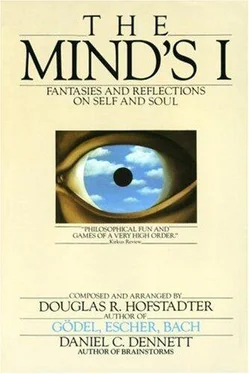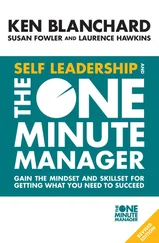However, whatever the realism of our excerpt, many moral and philosophical issues are well posed. What is the difference between having a mind—intellect—and having a soul—emotionality? Can one exist without the other? The justification given for killing Martha is that she is not as “valuable” as a human being. Somehow this must be a code word for the idea that she has “less of a soul” than a human does. But is degree of intellect a true indicator of degree of soul? Do retarded or senile people have “smaller souls” than normal people? The critic James Huneker, writing of Chopin’s Etude opus 25 no. 1, said “Small souled men, no matter how agile their fingers, should avoid it.” What an incredible pronouncement! Yet it has a certain truth to it, snobbish and elitist though it might be to say so. But who will provide the soul meter?
Is the Turing test not such a meter? Can we measure the soul through language? Needless to say, some qualities of Martha’s soul come through loud and clear in her utterances. She is very appealing, partly through her physical appearance (actually, how do we know this?), partly through the fact of our identifying with her, partly through her charmingly simple-minded syntax. We feel protective of her as we would of a baby or small child.
Well, all these devices and more will be exploited—even more insidiously!—in the following passage, another selection from The Soul of Anna Klane.
D.R.H.
8
Terrel Miedaner
The Soul of the Mark III Beast [11] Excerpt from The Soul of Anna Klane by Terrel Miedaner. Copyright © 1977 by the Church of Physical Theology, Ltd. Reprinted by permission of Coward, McCann & Geoghegan, Inc.
“Anatol’s attitude is straightforward enough,” Hunt said. “He considers biological life as a complex form of machinery.”
She shrugged, but not indifferently. “I admit being fascinated by the man, but I can’t accept that philosophy.”
“Think about it.” Hunt suggested. “You know that according to neoevolution theory, animal bodies are formed by a completely mechanistic process. Each cell is a microscopic machine, a tiny component part integrated into a larger, more complex device.”
Dirksen shook her head. “But animal and human bodies are more than machines. The reproductive act itself makes them different.”
“Why,” Hunt asked, “is it so wonderful that a biological machine should beget another biological machine? It requires no more creative thought for a female mammal to conceive and give birth than for an automatic mill to spew forth engine blocks.”
Dirksen’s eyes flashed. “Do you think the automatic mill feels anything when it gives birth?” she challenged.
“Its metal is severely stressed, and eventually the mill wears out.”
“I don’t think that’s what I mean by ‘feeling.’ ”
“Nor I,” Hunt agreed. “But it isn’t always easy to know who or what his feelings. On the farm where I was raised, we had a brood sow with an unfortunate tendency to crush most of her offspring to death—accidentally, I imagine. Then she ate her children’s corpses. Would you say she had maternal feelings?”
“I’m not talking about pigs!”
“We could talk about humans in the same breath. Would you care to estimate how many newborn babies drown in toilets?”
Dirksen was too appalled to speak.
After some silence Hunt continued. “What you see there in Klane as preoccupation with machinery is just a different perspective. Machines are yet another life form to him, a form he himself can create from plastic and metal. And he is honest enough to regard himself as a machine.”
“A machine begetting machines,” Dirksen quipped. “Next thing you’ll be calling him a mother!”
“No.” Hunt said. “He’s an engineer. And however crude an engineered machine is in comparison with the human body, it represents a higher act than simple biological reproduction, for it is at least the result of a thought process.”
“I ought to know better than to argue with a lawyer,” she conceded, still upset. “But I just do not relate to machines! Emotionally speaking, there is a difference between the way we treat animals and the way we treat machines that defies logical explanation. I mean, I can break a machine and it really doesn’t bother me, but I cannot kill an animal.”
“Have you ever tried?”
“Sort of,” Dirksen recalled. “The apartment I shared at college was infested with mice, so I set a trap. But when I finally caught one, I couldn’t empty the trap—the poor dead thing looked so hurt and harmless. So I buried it in the backyard, trap and all, and decided that living with mice was far more pleasant than killing them.”
“Yet you do eat meat,” Hunt pointed out. “So your aversion isn’t so much to killing per se as it is to doing it yourself.”
“Look, “ she said, irritated. “That argument misses a point about basic respect for life. We have something in common with animals. You do see that, don’t you?”
“Klane has a theory that you might find interesting,” Hunt persisted. “He would say that real or imagined biological kinship has nothing to do with your ‘respect for life.’ In actual fact, you don’t like to kill simply because the animal resists death. It cries, struggles, or looks sad—it pleads with you not to destroy it. And it is your mind, by the way, not your biological body, that hears an animal’s plea.”
She looked at him, unconvinced.
Hunt laid some money on the table, pushed back his chair. “Come with me.”
A half hour later Dirksen found herself entering Klane’s house in the company of his attorney, for whose car the entrance gate had automatically moved aside, and at whose touch the keyless front door had servoed immediately open.
She followed him to the basement laboratory, where Hunt opened one of several dozen cabinets and brought out something that looked like a large aluminium beetle with small, coloured indicator lamps and a few mechanical protrusions about it’s smooth surface. He turned it over, showing Dirksen three rubber wheels on its underside. Stenciled on the flat metal base were the words MARK III BEAST.
Hunt set the device on the tiled floor, simultaneously toggling a tiny switch on its underbelly. With a quiet humming sound the toy began to move in a searching pattern back and forth across the floor. It sopped momentarily, then headed for an electrical outlet near the base of one large chassis. It paused before the socket, extended a pair of prongs from an opening in its metallic body, probed and entered the energy source. Some of the lights on its body began to glow green, and a noise almost like the purring of a cat emanated from within.
Dirsen regarded the contrivance with interest. “A mechanical animal. It’s cute—but what’s the point of it?”
Hunt reached over to a nearby bench for a hammer and held it out to her. “I’d like you to kill it.”
“What are you talking about?” Dirksen said in mild alarm. “Why should I kil… break that… that machine?” She backed away, refusing to take the weapon.
“Just as an experiment,” Hunt replied. “I tried it myself some years ago at Klane’s behest and found it instructive.”
“What did you learn?”
“Something about the meaning of life and death.”
Dirksen stood looking at Hunt suspiciously.
“The ‘beast’ has no defenses that can hurt you,” he assured her. “Just don’t crash into anything while you’re chasing it.” He held out the hammer.
She stepped tentatively forward, took the weapon, looked sidelong at the peculiar machine purring deeply as it sucked away at the electrical current. She walked toward it, stooped down and raised the hammer. “But… it’s eating,” she said, turning to Hunt.
Читать дальше











